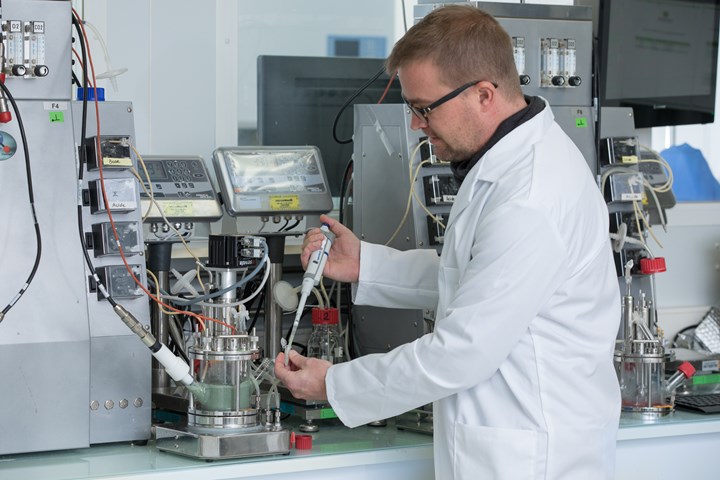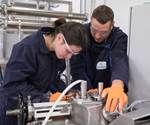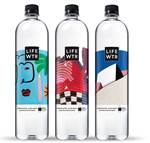Carbios Produces First Clear Plastic Bottles from Recycled Textile Waste
Carbios’ process, using highly specific enzymes, allows textile waste to be recovered and converted into a high quality grade of PET that is suitable for bottles.

Carbios’ recycling process fully breaks down and recycles PET plastic through its enzymatic depolymerization process, grounded in biology.
French biotech company Carbios has produced the first clear plastic bottles from enzymatically recycled textile waste. This latest milestone confirms Carbios’ technology’s capacity to recycle textile waste and opens up access to an additional waste stream of up to 42 million tons per year, worth over $40 billion. Carbios’ process enables low-value waste to be recovered and to have a new life in more challenging applications – the company says it facilitates the infinite recycling of PET-based plastics and textiles.
Around 85% of all textiles thrown away in the U.S. are either dumped into landfills or burned, and globally, just 12% of the material used for clothing ends up being recycled.
Martin Stephan, the Deputy CEO at Carbios, said while the bottle-to-bottle process has already been demonstrated, there are limitations in quantity and volume.
“Bottle-to-fiber is the typical process that is used today but we have demonstrated the first fiber-to-bottle process, which is much more difficult,” he said. “Carbios is the first and only company in the world using the biological technology for the end of life for plastics.”
These major outcomes were achieved as part of the CE-PET (Circular Economy PET) research project, of which Carbios is the lead alongside its partner TWB (Toulouse White Biotechnology). This project was financed by ADEME (the French Environment and Energy Management Agency).
Earlier this year, Carbios announced the launch of the construction of its industrial demonstration plant for the enzymatic recycling of PET plastic. The demonstration plant is located near Lyon, in France’s Chemistry Valley, the French hub of innovation and industrial production in the chemical, environmental and cleantech sector. Carbios is supported and advised by TechnipFMC for the engineering and construction of this demonstration plant.
The objective of the plant is to generate technical data that will allow Carbios to define the main parameters for each step of the enzymatic recycling process, on a sufficient scale to be able to plan the operation of future industrial units. The first phase of the system operations is scheduled to launch in the second quarter of 2021. This will allow Carbios to establish the complete engineering documents for the process, from waste to monomers, for the construction and implementation of the first industrial unit for a licensee.
“We’re very focused on our demo plant and will continue to demonstrate that our technology is very versatile,” Stephan said.
The company’s path to commercialization is supported by international cosmetic and beverage brands L’Oreal, NestléWaters, PepsiCo, and Suntory Beverage and Food Europe as well as multinational manufacturer Michelin and Novozymes, the world’s largest enzyme producer, to scale up and produce PET-degrading enzymes.
Related Content
-
Recycling: What's Ahead in Advanced Sorting Technology
As the industry tries to ramp up recycling, there are several innovative sorting solutions in the offing—ranging from enhanced optical sorting technologies and chemical tracers to advanced solutions based digital watermarks and artificial intelligence.
-
Purpose-Built System Enhances Capacity and Flexibility for Recycler
A Boston recycler invested in a turnkey shredding, granulation and elutriation system to expand its plastics reclaim business.
-
Looking to Run PCR on a Single Screw? Here’s What to Keep in Mind
Just drop it in and mix it up? Sorry, there’s a lot more to it than that. Here is some of what you need to consider.
















